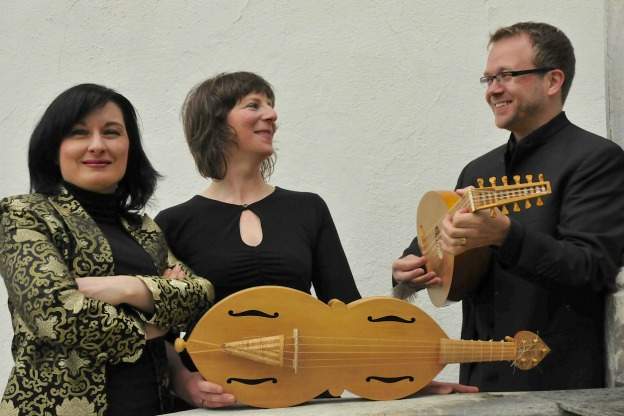
Ensemble Dragma's first CD is a recording devoted to the 15th-century poet-musician Heinrich Laufenberg.
Heinrich Laufenberg
Laufenberg was an important medieval composer but may be a less familiar name nowadays than Hildegard von Bingen or Guillaume de Machaut. If you're anything like me when you come across an unfamiliar historical name, you get curious, whip out your phone and google it, or ask Siri to tell you what she knows on the subject! But chances are your search results won't turn up the Heinrich Laufenberg in question today, but other Heinrich Laufenbergs, among them an early 20th-century politician who pioneered the National Bolshevism movement in Germany… Well, obviously, we're after another person here.
But even among the Heinrich's who fall into the medieval musician category, there is still an identity crisis. Some debate persists as to whether Heinrich Laufenberg is one and the same as Heinricus de Libero Castro...certainly aspects of their biographies align, but too little is known for scholars to say definitively. And, well, we're not going to resolve the question here!
The Siege of Strasbourg
Part of our uncertainty about Heinrich Laufenberg stems from the destruction of much of his life's work in the 19th century when the city of Strasbourg was bombed. Much of Laufenberg's song collection, some 120 pieces written in his own hand, were preserved in the Strasbourg Municipal Library as Codex B.121. But when the city fell under siege in 1870, the library and its collection of rare books and manuscript were largely destroyed.
Text without music
The loss is a cruel one for 21st-century listeners and scholars, but there is a bright spot in the story. Not all was lost. Thanks to the work of several 19th-century literary scholars before the bombardment-lead among them, Philipp Wackernagel-a nearly complete version of the song texts was made in 1867.
While the poetry and texts were the primary focus, some of the scholars involved in the project had also copied melodies into their personal research notes. Eventually, some of the texts and melodies were reunited, and in this indirect way, we now have musical notation for 17 of Laufenberg's 120 poems. In the end its not really very clear as to whether all, some, or only a small portion of songs ever had their own melodies to begin with.
Still, even with Wackernagel's reunited melodic sketches, there is not enough to present this music without a great degree of speculation. The text underlay can be problematic when the number of notes and amount of text don't accommodate one another, and the notation isn't always consistent either. Ensemble Dragama, studying contemporary sources and making their best educated guess along with a fair amount of trial and error, give what they think is a plausible reconstruction of what might have once been.
Laufenberg's contemporaries
Interspersed with Laufenberg on this recording are other contemporary works that place Laufenberg in his musically historical context. There are several anonymous songs taken from other similar manuscripts to that of Laufenberg's, as well as several songs by the so-called Monk of Salzburg, a figure slightly older than Laufenberg, and likely very influential on Laufenberg's style.
Intabulations
Also on this disc are several instrumental arrangements, or intabulations for solo instruments to play, a practice that was just emerging in Laufenberg's time.
The Buxheim Organ Book, contains over 200 of these song arrangements, popular songs with which Laufenberg is very likely to have been familiar. Although the Buxheim Organ Book is obviously meant for organ, common practice of the time seems to suggest that the intabulations weren't just played on the organ. They were easily transferred to other instruments like the lute.
Several of these instrumental intabulations are scattered throughout the CD, performed by Marc Lewon on the plectrum lute. Since these also only exist in fragments the missing bits were reconstructed for this recording.









